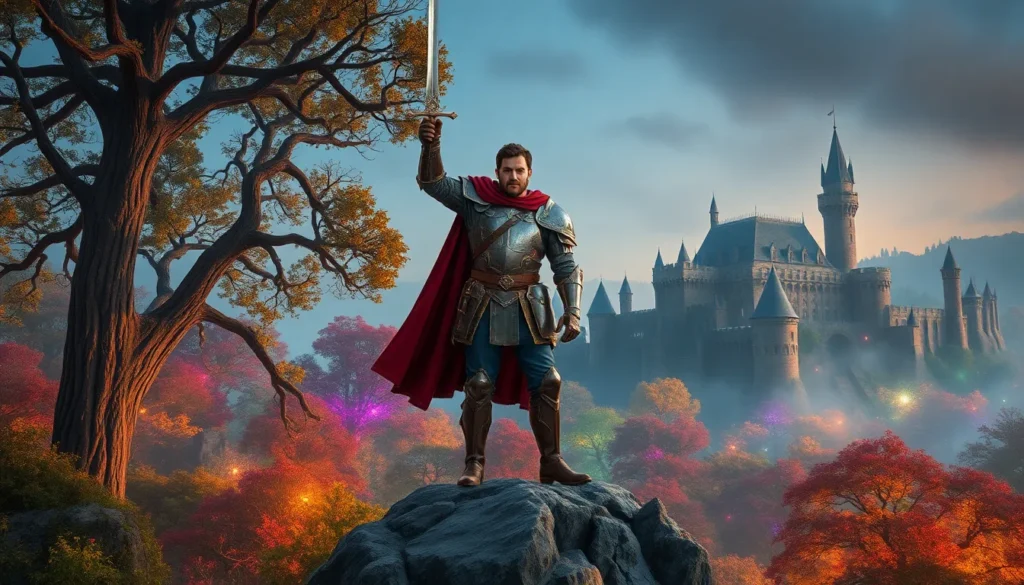Table of Contents
ToggleIn a world where binge-watching has become a competitive sport, TV shows reign supreme as the ultimate source of entertainment. From heart-pounding dramas to laugh-out-loud comedies, there’s a series out there for everyone. Whether you’re looking to escape reality or simply want to join the latest water cooler conversation, the right show can transport you to another universe—preferably one where the snacks are endless and the cliffhangers keep you up at night.
With an ever-expanding array of streaming platforms and genres, the challenge isn’t finding something to watch; it’s deciding which gem to dive into next. So grab your remote, settle in, and prepare for a journey through the captivating world of TV shows that’ll have you laughing, crying, and maybe even questioning your life choices. After all, who needs therapy when you’ve got a season finale to dissect?
Overview of TV Shows
TV shows represent a vast landscape of entertainment offering diverse experiences. Each genre, ranging from drama to comedy, appeals to different viewer preferences. Viewers find themselves captivated by multifaceted characters and intricate storylines. Streaming platforms facilitate access to a large array of options, making selection a challenge. The competition among networks and platforms leads to an increasing number of high-quality productions.
Genres such as drama and comedy often dominate viewership statistics, but niche genres also gain dedicated followings. Recent data indicates that over 80 percent of households in the U.S. subscribe to at least one streaming service. Audience engagement often transcends mere viewing; it leads to discussions, fan theories, and social media interactions. Awards and critical acclaim contribute to elevating the prestige associated with various shows.
Sample statistics reveal that approximately 60 percent of adults participate in binge-watching practices, learning about entire series in mere days. Challenges like choosing what to watch next highlight the abundance of content available. The immersive nature of these shows encourages viewers to escape into different worlds. TV shows not only entertain but also reflect cultural trends and societal issues, prompting meaningful conversations among viewers.
As the consumption of TV shows continues to evolve, new formats such as limited series or interactive viewing experiences gain popularity. Collaboration between writers, directors, and actors leads to innovative storytelling techniques. Audiences eagerly anticipate what new series will emerge next, creating a dynamic and ever-changing media landscape.
Genre Diversity in TV Shows

TV shows encompass a wide array of genres, each catering to different viewer tastes and preferences. The diversity in programming has reshaped entertainment choices significantly.
Comedy
Comedy shows focus on humor, creating lighthearted experiences that resonate with audiences. Sitcoms, sketch comedies, and stand-up specials are popular formats within this genre. Shows like “The Office” and “Parks and Recreation” exemplify character-driven narratives infused with relatable humor. Viewers often turn to comedy for a quick escape, leading to high engagement rates, especially during stressful times. Series often feature ensemble casts that navigate personal and professional relationships, keeping audiences entertained and laughing.
Drama
Drama series capture the complexities of human emotions and situations. From character arcs to intricate plots, dramas such as “Breaking Bad” and “This Is Us” draw viewers into compelling storytelling. The immersive nature of drama allows audiences to explore deep themes like love, loss, and morality. Characters often face moral dilemmas, prompting reflections on real-life issues. With strong writing and gripping performances, dramatic shows create lasting impressions, fostering viewer attachment and discussions.
Science Fiction
Science fiction shows transport viewers to imaginative worlds where the possibilities seem endless. Adventures in time travel, space exploration, and futuristic technology spark curiosity and wonder. Iconic series like “Stranger Things” and “The Expanse” merge thrilling plots with thought-provoking themes. Audiences appreciate science fiction for its ability to explore complex ideas about society and technology through engaging narratives. Unique worlds and phenomena challenge perceptions of reality, fostering lively conversations among fans.
Reality TV
Reality TV offers an unscripted glimpse into everyday life, showcasing competition, relationships, and personal challenges. Popular formats include talent competitions, makeover shows, and lifestyle series, with “The Bachelor” and “Survivor” leading the pack. These shows often captivate audiences by highlighting real human experiences and dramatic moments. Engaging storylines and authentic emotions connect viewers with participants, blurring the lines between entertainment and reality. Reality TV’s influence on culture drives discussions around social issues and personal choices.
The Impact of TV Shows on Culture
TV shows shape culture significantly, reflecting societal values and trends. They often serve as mirrors, highlighting issues such as race, class, and gender. Diverse narratives drive discussions among viewers, while dramatic story arcs can spark social movements. For instance, shows like “The Handmaid’s Tale” resonate by addressing themes of oppression, inspiring conversations around women’s rights. Audiences engage with characters facing relatable struggles, promoting empathy and understanding. Consequently, these portrayals create space for dialogue on pressing societal issues, making TV a platform for social commentary.
Social Commentary
Each episode can reveal deeper truths about society. Characters navigate real-world challenges, resonating with viewers’ experiences. “The Wire,” for example, delves into systemic inequality and justice, illustrating urban struggles in America. Audiences often find themselves contemplating their values as they watch intricate storylines unfold. As cultural conversations evolve, TV shows play a vital role in addressing contemporary issues, prompting both reflection and action. Strong character representation encourages marginalized voices, leading to greater inclusivity within media.
Influence on Trends
TV shows frequently set and influence societal trends. Fashion styles gain popularity as viewers emulate characters’ wardrobes, demonstrated by series like “Sex and the City.” Language and phrases from popular shows often seep into everyday conversations, shaping vernacular. Streaming platforms also drive consumption habits, with entire seasons dropped at once popularizing binge-watching culture. New genres emerge and evolve, responding to audience preferences and societal changes, which expands the media landscape. The intersection of TV and culture continually drives innovation, keeping viewers engaged with fresh narratives and formats.
The Evolution of TV Shows
The landscape of television has transformed significantly over the years.
From Traditional Broadcasting to Streaming
Traditional broadcasting established a rigid schedule, where viewers gathered around their TVs at specific times. With the advent of streaming services, this paradigm shifted dramatically. On-demand viewing now allows audiences to access an extensive library of content at their convenience. Data shows over 80 percent of U.S. households subscribe to at least one streaming service, highlighting a substantial change in consumption habits. Viewers can binge entire seasons, leading to immersive experiences that traditional formats never allowed. Furthermore, platforms constantly release new series, catering to diverse tastes and ensuring there’s always something fresh to enjoy.
Changes in Storytelling Techniques
Narratives have evolved alongside viewer preferences. Complex characters and intricate plots now dominate TV storytelling. Producers often explore multifaceted themes that resonate with contemporary audiences. For instance, limited series formats have gained popularity, allowing for deeper storytelling in shorter spans. Single-season arcs provide a focused narrative, inviting viewers to invest emotionally in characters and plots. Engaging storylines drive discussions and fan theories, enriching viewer experiences. With approximately 60 percent of adults now binge-watching, the immersive nature of contemporary shows encourages both emotional connections and cultural conversations.
Notable TV Shows to Watch
Television showcases a wealth of programs reflecting various genres and themes. Below are notable selections that stand out in the landscape of viewing options.
Classics That Shaped Television
Classics have defined television history over the decades. “I Love Lucy” introduced groundbreaking comedic elements in the 1950s, while “MAS*H” tackled serious war issues through humor. “The Twilight Zone” pushed boundaries of storytelling by blending fantasy and horror, captivating diverse audiences. “Cheers” created a lasting portrayal of social interactions in a bar setting, influencing sitcoms that followed. These shows laid the foundation for narratively rich content and character-driven storylines.
Modern Hits
Modern hits dominate viewer engagement with innovative approaches. “Game of Thrones” revolutionized epic storytelling by intertwining politics and fantasy. “The Crown” offers a compelling depiction of British royalty, exploring personal struggles amid public scrutiny. “Stranger Things” captivates with its nostalgic homage to the 1980s, combining sci-fi and horror elements seamlessly. “The Mandalorian” expands the Star Wars universe, appealing to both seasoned fans and newcomers. Each of these series exemplifies creativity and depth, attracting wide audiences and sparking conversations.
TV shows have become an integral part of modern entertainment shaping cultural conversations and reflecting societal values. With an ever-expanding array of genres and innovative storytelling techniques viewers can find something that resonates with them. The shift to streaming has not only changed how audiences consume content but has also fostered deeper engagement through discussions and fan interactions.
As the landscape continues to evolve new formats and narratives will emerge keeping viewers excited about what’s next. Whether it’s a heartfelt drama or a thrilling sci-fi adventure the world of television offers endless possibilities for escapism and connection. Embracing this dynamic medium allows viewers to explore diverse experiences and engage with the stories that matter most to them.




